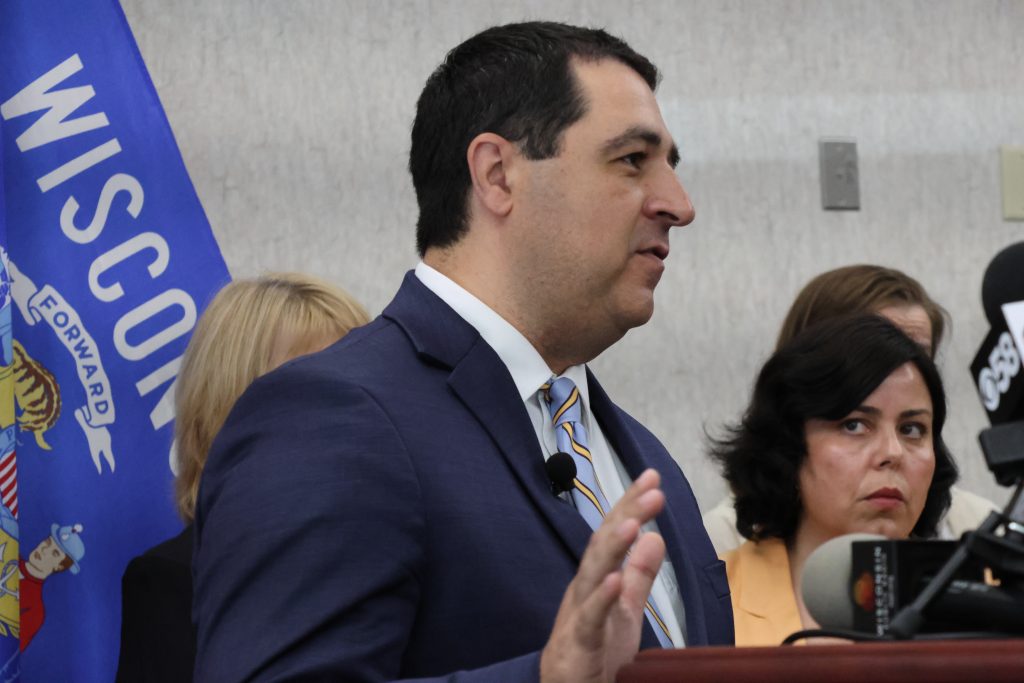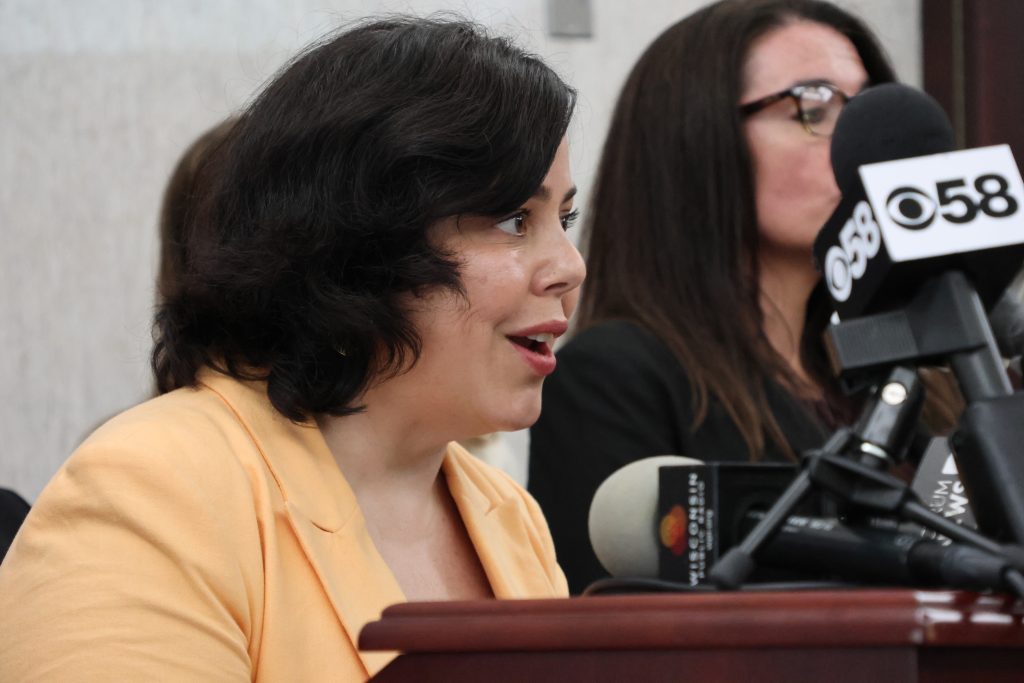
Source: Chali Pittman / Civic Media
Abortion legal after Wisconsin Supreme Court decision
Wisconsin’s top court says the 176-year-old statute doesn’t ban modern abortion
MADISON, Wis (CIVIC MEDIA) – Wisconsin’s top court says a state statute from 176 years ago does not ban abortion. The Wisconsin Supreme Court issued its decision shortly after 8 a.m. Wednesday.
At issue is a statute written in 1849, written before women had the right to vote and heavily revised in 1858 to be more restrictive. The language criminalizes abortion providers and others who “destroy the life of an unborn child.”
The prohibition has remained on the books in Wisconsin, but was superseded for decades by federal abortion protections enshrined by Roe v Wade. When the U.S. Supreme Court upended those protections in Dobbs v. Jackson Women’s Health in 2022, the statute came back into play.
Wisconsin, however, has passed more regulations on abortion since Roe. The lawsuit, filed by state Attorney General Josh Kaul and abortion providers in the days following the Dobbs decision, contends that newer laws directly conflict with and override the 1849 law.
That’s a distinction the court’s liberal majority found convincing.
“The legislature impliedly repealed § 940.04(1) as to abortion by enacting comprehensive legislation about virtually every aspect of abortion including where, when, and how healthcare providers may lawfully perform abortions,” wrote Justice Rebecca Dallet in a 17-page majority opinion.
“That comprehensive legislation so thoroughly covers the entire subject of abortion that it was clearly meant as a substitute for the 19th century near-total ban on abortion.”
The ruling was 4–3, with all four liberal justices in the majority and all three conservatives dissenting. The majority’s decision effectively upholds legal abortion access in Wisconsin.
Chief Justice Jill Karofsky concurred separately, writing that the legal uncertainty had left doctors in limbo and put survivors of sexual assault at risk.
“Severe abortion restrictions operate like death warrants,” Karofsky wrote, recounting stories of women who died after being denied abortion care in other states.
The conservative justices issued sharp dissents accusing the majority of erasing a law it didn’t like.
“This is pure policymaking… Today, the court aggrandizes power to itself, rewrites the law in its own image, and undermines our constitutional order,” wrote Justice Brian Hagedorn.
“With no apparent sense of irony, the concurrence claims abortion restrictions amount to “death warrants” for women, ignoring the people who feel just as passionately that abortion kills innocent human lives—more than 1,000,000 in each of the last two years,” wrote Justice Rebecca Bradley.
Sheboygan County District Attorney Joel Urmanski, the defendant in the case, had sought to enforce the 1849 law in his county. After a lower court ruled against him last year, he said, “While it may be that the citizens of Wisconsin would be better served by a different statute, I do not believe it is my job or the role of the courts to make that determination.”
The court heard oral arguments in the case last November. This ruling comes at the close of the court’s annual term.

Democrats celebrated the decision.
“Today’s decision affirms that access to reproductive healthcare will continue to be available… helping ensure Wisconsin women today are not forced to face what it’s like to live in a state that bans nearly all abortions—even in cases of rape and incest,” said Governor Tony Evers, praising the decision in a statement.
“We have now received clarity,” said Attorney General Josh Kaul at a press conference inside the Wisconsin Department of Justice on Wednesday. Kaul brought the lawsuit over three years ago.
“When we filed that suit, we made clear that we want to protect reproductive freedom in the state of Wisconsin. But we also wanted to bring clarity so that doctors in Wisconsin, women in Wisconsin, would know what the state of the law was in the state of Wisconsin,” he added.

“Today’s ruling restores some stability for patients and providers. It affirms what doctors needed to know — that they can do their jobs,” said Michelle Velasquez, Chief Strategy Officer of Planned Parenthood of Wisconsin, which provides abortions at locations in Milwaukee, Madison, and Sheboygan.
She expressed disappointment that the state’s high court dismissed another case brought by Planned Parenthood that sought to declare an abortion ban unconstitutional. Justice Annette Ziegler included a statement with the announcement of the case’s dismissal.
“The fight to restore access is far from over,” said Velasquez, pointing to a vote in Congress to defund Planned Parenthood, which could result in the closures of hundreds of locations that provide a wide range of health services.
Lawmakers react
“This was a hard-won victory for the state of Wisconsin,” said Senate Minority Leader Diane Hesselbein (D-Middleton) as work continued on the budget.
Meanwhile, Senate Majority Leader Devin LeMahieu (R-Oostburg) said the court “went rogue,” although he emphasized that he hadn’t had time to review their decision.
“I’m not even sure what weird rationale our liberal Supreme Court used to do this,” he said.
Wisconsin still has a ban on abortion after 20 weeks post-fertilization, with exceptions for medical emergencies, under a bill adopted in 2015. Other restrictions also exist.
Some Democratic state lawmakers have sought to change that. A bill introduced earlier this year by state Sen. Kelda Roys and state Rep. Lisa Subeck would create a statutory right to abortion and eliminate some restrictions.
This post has been updated to include developing information, and corrected to reflect accurate dates and details about the language of the state statute.

Jimmie is Civic Media’s Sports Director who also works in digital content, sports, news, and talk programming. Email him at [email protected].

Savanna Tomei Olson is Assistant News Director at Civic Media, guiding our news team in editorial decisions. She is also the reporter and voice behind newscasts on WMDX in Madison. Email her at [email protected].

Chali Pittman is Civic Media’s News Director. She’s worked for over a decade in community and nonprofit news, most recently leading news and talk programming at community radio WORT in Madison. Reach her at [email protected] or (608) 616-2240.
Want More Local News?
Civic Media
Civic Media Inc.
The Civic Media App
Put us in your pocket.